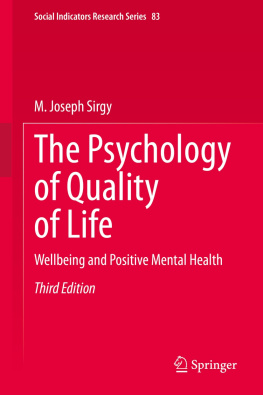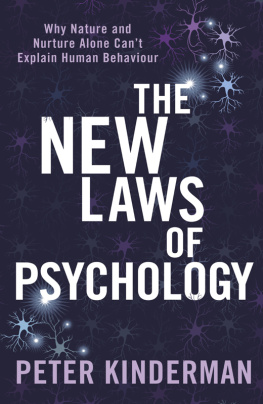Sommaire
Pagination de l'dition papier
Guide
POSITIVE
PSYCHOLOGY IN
CHRISTIAN
PERSPECTIVE
Foundations, Concepts, and Applications
CHARLES HACKNEY
InterVarsity Press
P.O. Box 1400, Downers Grove, IL 60515-1426
ivpress.com
2021 by Charles H. Hackney
All rights reserved. No part of this book may be reproduced in any form without written permission from InterVarsity Press.
InterVarsity Press is the book-publishing division of InterVarsity Christian Fellowship/USA, a movement of students and faculty active on campus at hundreds of universities, colleges, and schools of nursing in the United States of America, and a member movement of the International Fellowship of Evangelical Students. For information about local and regional activities, visit intervarsity.org.
All Scripture quotations, unless otherwise indicated, are taken from The Holy Bible, New International Version, NIV. Copyright 1973, 1978, 1984, 2011 by Biblica, Inc. Used by permission of Zondervan. All rights reserved worldwide. www.zondervan.com. The NIV and New International Version are trademarks registered in the United States Patent and Trademark Office by Biblica, Inc.
While any stories in this book are true, some names and identifying information may have been changed to protect the privacy of individuals.
The publisher cannot verify the accuracy or functionality of website URLs used in this book beyond the date of publication.
Cover design and image composite: Autumn Short
Images: rough white surface photo Pawel Czerwinski / Unsplash.com
abstract vector plant ANASTASIIA DMITRIEVA / iStock / Getty Images Plus
ISBN 978-0-8308-2871-5 (digital)
ISBN 978-0-8308-2870-8 (print)
This digital document has been produced by Nord Compo.
For listening to my manic ravings about
positive psychology during the writing process,
and for reminding me that the world exists
outside of the writing process,
this book is dedicated to my very patient wife.
Part One
THE BIG
PICTURE
Chapter One
What Is Positive Psychology?
Life achieves its summit when it does to the uttermost that which it was equipped to do.
JACK LONDON, WHITE FANG
WELCOME TO POSITIVE PSYCHOLOGY
A little over two decades ago, the president of the American Psychological Association, Martin E. P. Seligman, announced the beginning of a new direction in psychological research and practice. He called this movement positive psychology, the study of the conditions and processes that contribute to the flourishing and optimal functioning of people, groups, and institutions (Gable & Haidt, 2005, p. 203). Since then, positive psychology has exploded in popularity and influence, spawning graduate degrees, research centers, international conferences, and academic journals. Positive psychology has been embraced by researchers and practitioners in every subdiscipline of psychology. Teachers have begun employing positive psychology in the classroom (Gilman, Huebner, & Furlong, 2009). Employers and business consultants have been applying positive psychology in the workplace (Froman, 2010). The US Army built the Comprehensive Soldier Fitness Program on a foundation of positive psychology (Casey, 2011). Politicians have discussed using positive psychology to shape public policy (Cameron, 2010).
Positive psychology has also seen application in the church (McMinn, 2017). Theologians (e.g., Charry, 2010) and biblical scholars (e.g., Strawn, 2012) have brought Christian ideas about happiness and flourishing to center stage. Many Christian colleges and universities have added courses in positive psychology to their roster. Biola Universitys Center for Christian Thought dedicated its 20132014 research theme to Psychology and Spiritual Formation (Crisp, Porter, & Ten Elshof, 2019), including the question, How does positive psychology contribute to a Christian understanding of human flourishing? Flourishing, it seems, is a hot topic all over.
WHY IS THERE A POSITIVE PSYCHOLOGY?
When Seligman launched positive psychology in 1998, he argued that the movement was necessary because the field had become unbalanced. Originally, psychology had a threefold mission: curing mental illness, making the lives of all people more productive and fulfilling, and identifying and nurturing high talent (Seligman & Csikszentmihalyi, 2000, p. 6). However, events in the twentieth century led to the first of those missions being prioritized over the second and third, to the point that nowadays many people think psychologist is just another way of saying one who cures mental illness.
Lets look at how that happened.
POSITIVE PSYCHOLOGY BEFORE POSITIVE PSYCHOLOGY
The title of the first official positive psychology book is Authentic Happiness: Using the New Positive Psychology to Realize Your Potential for Lasting Fulfillment (Seligman, 2002). Note the use of the word new to describe positive psychology. Similarly, Seligmans 2011 book is titled Flourish: A Visionary New Understanding of Happiness and Well-Being. Much of the excitement about positive psychology is the sense that it is a new direction for psychology. However, positive psychologists are aware that this approach is new only in that it is a revitalization of ideas that have been around for as long as psychology itself.
The first positive psychologist was in fact the first North American psychologist, William James (Taylor, 2001). Jamess Principles of Psychology (1890) is primarily concerned with topics such as perception, memory, and the nature of thought, but James also discussed positive phenomena such as sympathy and altruism, the constructive drive, play, and aesthetic enjoyment. Jamess most extensive treatment of happiness and flourishing can be found in his volume on the psychology of religion, The Varieties of Religious Experience (1902). Here, James describes the effect of religious devotion on peoples lives. His primary conclusion is that religion provides a new zest which adds itself like a gift to life and an assurance of safety and a temper of peace, and, in relation to others, a preponderance of loving affections (p. 401). We will discuss more recent work on the psychology of religion and flourishing in chapter twenty-one.
Gordon Allport is considered the patron saint of personality, having done more than any other scholar to establish the study of normal personality as a mainstream topic for psychological consideration (Nicholson, 2003). Early in his career, Allport found himself in Vienna and, in a fit of fanboyish enthusiasm, arranged for a meeting with the man himself: Sigmund Freud. Allport did not have anything prepared to talk about with Freud, so he tried to make conversation, including relating to Freud a story about a dirt-phobic boy whom Allport had seen on a train. Freud listened (I always imagine him stroking his beard as he did so), then asked, And was that little boy you? (Evans, 1971, p. 4). Allports impression of Freud was that the great psychiatrist tended to read far too much into things and interpreted far too many observations as indicators of unconscious pathology. As his career progressed and he became a leading figure in the study of personality, Allport (1937, 1955) continued to criticize psychoanalysis for overemphasizing illness and infantile neuroses. He sought to compensate for this tendency by developing the scientific study of the mature personality. His description of psychological maturity emphasized self-acceptance, connections to other people, dedication to higher ideals, zest, security, a well-developed philosophy of life, and an equally well-developed sense of humor (Allport, 1961).











